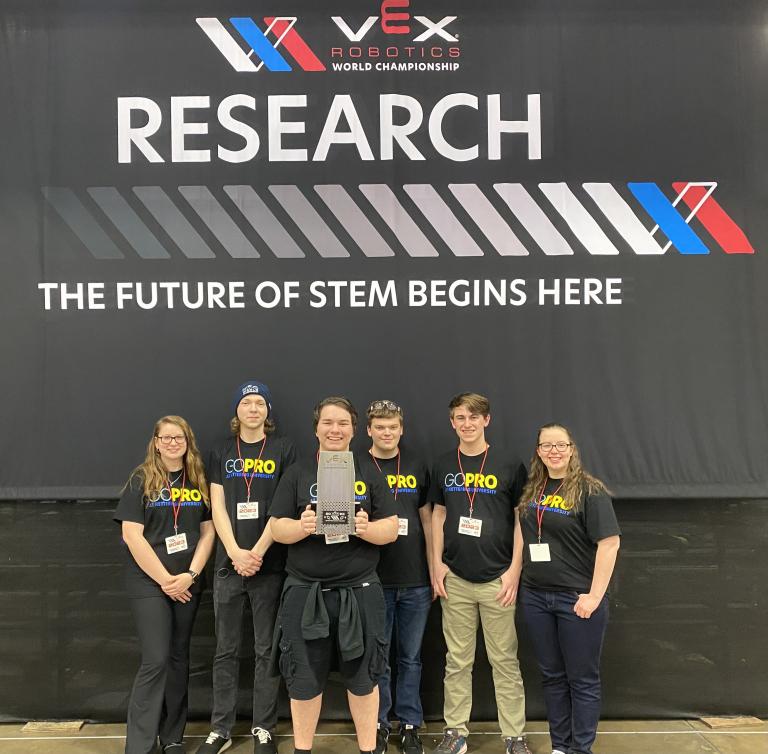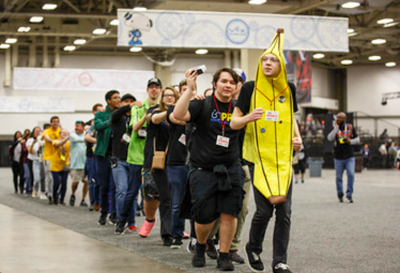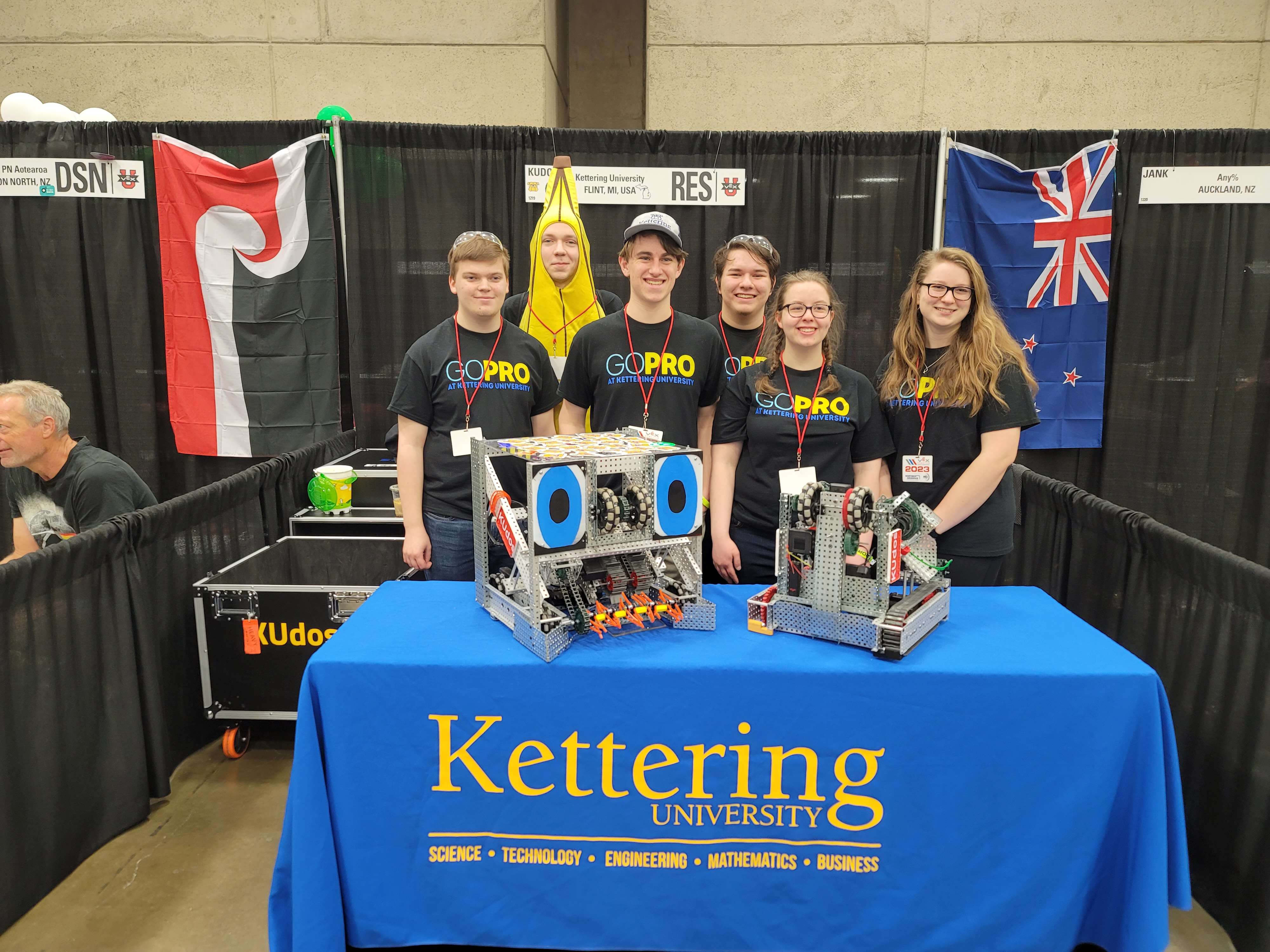
“I highly recommend joining the team to anyone interested in robotics. Not only do you get to add some great experience to your resume, but you will absolutely make some great memories and friendships.”
In its first trip to the VEX Robotics World Championship, the Kettering University VEX U team, KUdos, captured the Sportsmanship Award.
“It felt amazing. We didn’t go in with the expectation of receiving an award,” said Connor O’Keefe (’25, CS). “We were just there for the experience and to learn for next year.”
Teammate Jonathon Houston (’26, CS) agreed.
“When our team received the Sportsmanship Award, we could not have been more excited,” he said. “We had already achieved our goal of making it to the world championship for our inaugural season, so the award could only have been described as the icing on the cake.”
The team competed at the championship April 27-29 in Dallas.
The Sportsmanship Award rewards the team that earned the respect and admiration of volunteers and other teams at the event. Criteria for the award include:
- Team is courteous, helpful and respectful to everyone at the event, on and off the field
- Team interacts with others on the game field in the spirit of friendly competition and cooperation
- Team demonstrates respect and willingness to help event staff, other teams and spectators
- Team demonstrates excitement and enthusiasm throughout the event
“Winning the Sportsmanship Award was really cool, especially since I feel like there were a lot of teams that were worthy of it,” said Andrew Meikle (’25, ME). “Everyone we played was very friendly, and it made for a great experience, even though we did not perform to the level I had hoped for.”
Overall, KUdos ranked 41 of 96 teams in the championship.
“Competing at Worlds at a college level was difficult because you’re against the best of the best in the world, but it was still a lot of fun even with that pressure,” said Katee Callicutt (’27, ME). “We made the best of what we had and did fairly well.”
Joan Welk (’23, CE) also enjoyed the time at Worlds.
“It was super fun,” she said. “We had to rely on each other and our robots, rather than other alliance partners, in order to succeed. I have never been to States for a robotics team, so for us to be able to go to Worlds was awesome and a little overwhelming.”
For David Chomicz (’27, ME), competing at the collegiate level sparked a mix of emotions.
“Competing at Worlds, especially as a first-year team at the college level, felt very intimidating,” he said. “But seeing all of those incredibly good teams also inspired us to build better robots in the future.”
The challenge this year was called Spin Up. In each match, four teams form two alliances with the robots they designed and built. Each match consisted of a 15-second autonomous period followed by a 1-minute, 45-second driver-controlled period. Robots moved discs to their respective goal areas for points and spun rollers to their alliance colors. The alliance that scored the most points won. At the university level, teams used two robots.
Callicutt said the team gained valuable experience in its first season and in its trip to the championship.
“We learned a lot about creating a team dynamic and having someone more in a leadership role to keep everything organized,” she said.
Chomicz said team members learned more about how to structure their team.
The team also plans to do more computer-aided design (CAD) modeling ahead of their next build.
“This year was really a huge learning experience,” Callicutt said. “We will take that and further improve our group and do a lot better next year.”
Meikle left Dallas with a list of changes to implement next year that could make a huge difference.
“The robots that look the best do not always perform the best, so we need to make sure we do not get caught up worrying about aesthetics,” he said. “Another thing is we need to focus on building more reliable robots. There were a couple of matches where a few simple changes to the bot would have made our scores much tighter. The last thing I think is really important is we need to make sure we are done early enough for the programmers to have time to develop a good autonomous routine. Matches were often determined by the end of the autonomous period.”
This wasn’t the team’s first award this season, as it won the Judge’s Award at a competition in January.
To qualify for the Judge’s Award, teams must exhibit a high-quality interview; display special attributes, exemplary effort and perseverance at the event; overcome an obstacle or challenge; and achieve a goal or special accomplishment.
In Kettering’s case, only two team members could attend the competition to run both robots. The pair not only made it through, but they also doubled the team’s programming skills score.
Winning this award was Welk’s favorite part of the season.
“Andrew and I were the only members that could make it, and it felt really good that the judges saw our struggles and accomplishments and wanted to give us that award,” she said.
Attending Worlds was the high point for O’Keefe.
“Overall, the experience brought us much closer as a team, developing bonds with people we only met at the beginning of the season,” he said. “Also, the conga line was pretty great.”
The conga line also stood out for Houston, who led the line of participants while dressed in a banana costume. With the help of the event MC, KUdos organized the line and led several teams and volunteers from the competition area to the pits. O’Keefe provided a speaker to keep the music with them.
“Not only was it a fun way to get from the field back to our pits, which was almost a half-mile trek, but it increased our reputation with staff and other teams who joined,” Houston said.
Both Houston and O’Keefe said the team welcomes new members.
“Competing on a VEX U team has been an amazing experience this year,” O’Keefe said. “If any Kettering students are interested in joining us for the next competition season, reach out, because we’d love to have you!”
Houston said students will get more than they expected out of participating.
“I highly recommend joining the team to anyone interested in robotics,” he said. “Not only do you get to add some great experience to your resume, but you will absolutely make some great memories and friendships.”
Another benefit is working with students from other sections, Meikle said.
“We are in search of new talent to join our team in both A and B sections, and getting to work with people from the opposite section is a unique experience at Kettering,” he said.
Kettering has hosted VEX camps and workshops since 2015. Scholarships are also available for students who are active competitors or mentors of VEX or other competitive robotics organizations. Students can earn up to $5,000 yearly (up to $25,000 over five years) in renewable scholarships.
This year, Kettering University was a field sponsor at the world championships. The University hosted the state championship in February.
The University organizes VEX competitions in partnership with the non-profit Robotics Education and Competition (REC) Foundation, an educational organization whose mission is to increase student interest and involvement in science, technology, engineering and math (STEM). Dan Mantz, a 1991 Kettering alumnus, is Chief Executive Officer of REC.
For more information about robotics at Kettering University, click here.
